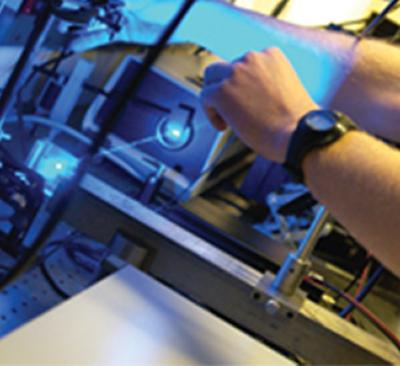University of Southampton to share in £350 million fund to train tomorrow's engineers and scientists

The University of Southampton is to share in a £350 million fund, which will be used to train over 3,500 post graduate students in engineering and physical sciences, announced today by Universities and Science Minister, David Willetts.
This is the UK's largest investment in post graduate training in engineering and physical sciences. It will fund over 70 new Centres for Doctoral Training (CDTs), spread across 24 UK universities.
The University of Southampton is involved in three new CDTs –
The CDT in Next Generation Computational Modelling (CDT NGCM):
Computational modelling is a critically important driver for new technology (from the Airbus 380 to MRI scans), new science (from climate change to drug design), and new policy (from infrastructure to finance). The CDT NGCM, which is led by Professor Hans Fangohr from the Computational Modelling Group at the University of Southampton, will work with world-leading industrial partners to train and support at least 11 PhD students per year. The NGCM’s four-year PhD programme will train students to exploit cutting edge new hardware technology and develop innovative simulation methods, which go beyond the state-of-the-art in order to address the most pressing scientific and engineering challenges of the 21st century. Follow NGCM on twitter: http://twitter.com/NGCM_Soton.
The CDT in Theory and Modelling in Chemical Sciences:
Theory and computer modelling play an increasingly central role in chemical and allied sciences, providing the means to understand, predict and design new molecules and materials. This CDT will combine the expertise of leading groups in Southampton (represented by Professor Jonathan Essex, Head of Computational Systems Chemistry), Bristol and Oxford universities, to transform graduate-level training in computational and theoretical chemistry. Students will receive integrated, in-depth training in the core activities of fundamental theory, software development, and application to contemporary research challenges. The programme further includes extensive outreach to the wider national research and user community.
The CDT in New and Sustainable Photovoltaics (PV):
This CDT will support the transformation of PV in the UK that will in turn aid the country to achieve its renewable energy obligations, and will generate jobs in the technology sectors as well as local manufacturing and installation. The CDT is a multicentre team of seven institutions – Southampton (represented by Professor Pavlos Lagoudakis from the University’s Hybrid Photonics group), Liverpool, Bath, Sheffield, Oxford, Loughborough and Cambridge – that will train highly-skilled students capable of transforming state-of-the-art research and development across the sustainable energy and PV sectors and, in so doing, contribute to the production and implementation of improved PV products and systems.
Professor Philip Nelson, Pro Vice-Chancellor at the University of Southampton, says: “We are delighted to be participating in three of the Centres for Doctoral Training announced so far. All of these cover areas of research that are vital to our country's future and we are very pleased to be so directly involved in providing the highly skilled scientists and engineers that are crucial to the UK economy.”
The funding, targeted at areas vital to economic growth, has been allocated by the Engineering and Physical Sciences Research Council (EPSRC).
Science Minister David Willetts said: “Scientists and engineers are vital to our economy and society. It is their talent and imagination, as well as their knowledge and skills, that inspire innovation and drive growth across a range of sectors, from manufacturing to financial services.
“I am particularly pleased to see strong partnerships between universities, industry and business among the new centres announced today. This type of collaboration is a key element of our industrial strategy and will continue to keep us at the forefront of the global science race.”
A total of 1000 partners will be involved in the Centres, leveraging in around £250 million worth of support. Many of the Centres will involve research that connects to key industries and important technologies which will aid innovation and growth. EPSRC may announce a further group of Centres if more resource can be secured.
Paul Golby, EPSRC’s Chair, said: “Centres for Doctoral Training have already proved to be a great success and the model is popular with students, business and industry. These new centres will give the country the highly trained scientists and engineers it needs and they will be equipped with skills to move on in their careers. The standard of applications for Centres was very high and more could have been funded if we had the capacity.”